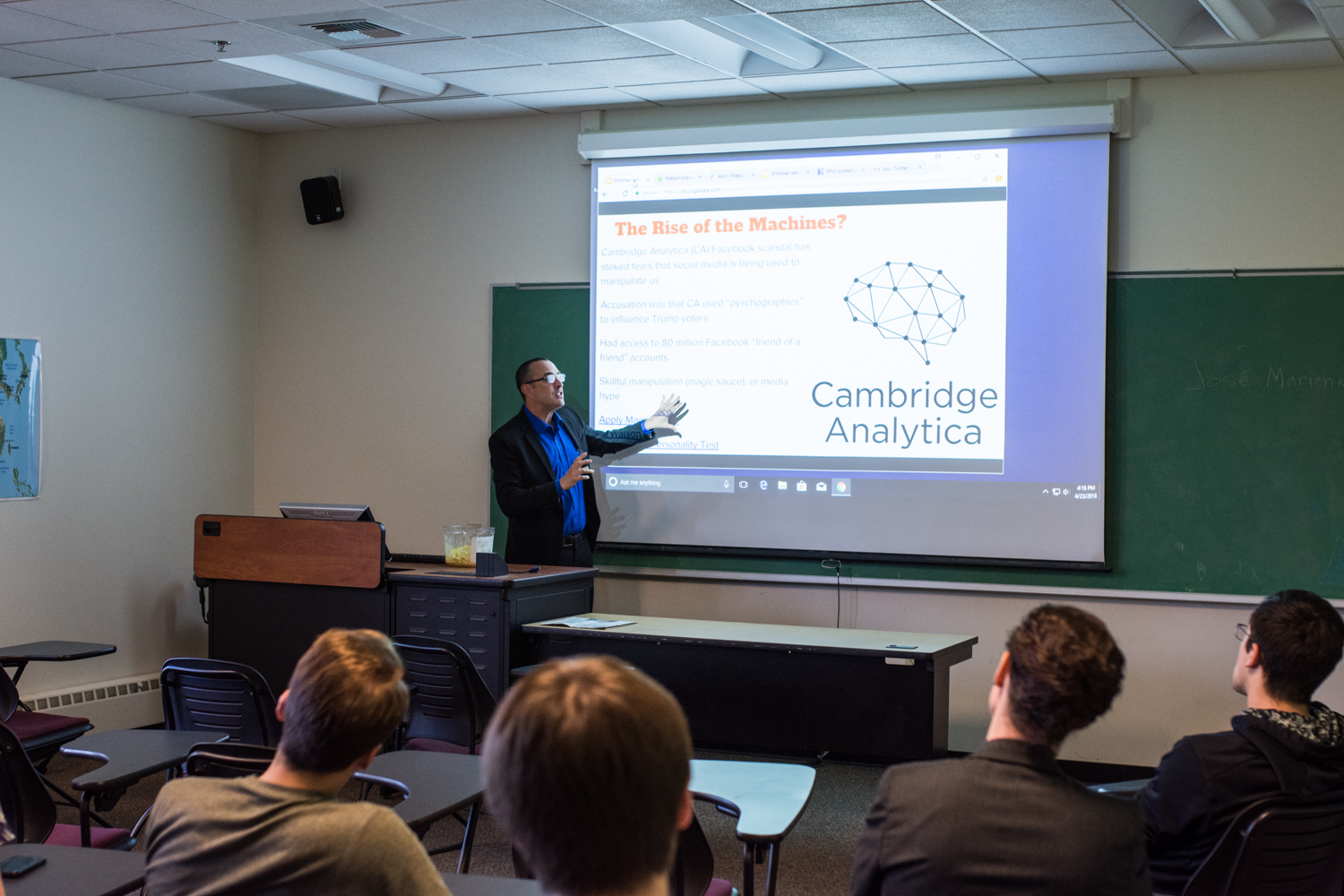Big Data & Democracy
April 24, 2018
This past Monday, April 23, Whitman hosted Dr. José Marichal, Professor of Political Science at California Lutheran University. In a well-attended talk, Dr. Marichal addressed his titular topic, “The Role of Big Data and Artificial Intelligence in Democratic Life,” focusing on its current relevance in the wake of Russian meddling and the recent Cambridge Analytica scandal.
Cambridge Analytica (CA) is a British consulting firm whose political arm is identified on its website as “the global leader in data-driven campaigning.” The firm was contracted by the Trump, Cruz and Carson campaigns for the 2016 presidential election and, as Time reported in May of 2017, was part of a congressional investigation into “ties between those companies [CA and Breitbart News] and right-wing web personalities based in Eastern Europe who the U.S. believes are Russian fronts.”

Jose Marichal giving a talk titled “Predictive Politics: The Role of Big Data and Artificial Intelligence in Democratic Life.”
As Dr. Marichal stated in his talk, the firm — for which Steve Bannon served as Vice President until 2016 — “had access to 80 million ‘friend of a friend’ accounts.” With this access, they are accused of using “psychographics” — the analysis of metadata (in this case a user’s Facebook habits) to generate a psychological profile of an individual to target and influence Trump voters.
To demonstrate the sorts of profiles that can be generated, Dr. Marichal directed attendees to ‘Apply Magic Sauce,’ a tool made by the University of Cambridge (to which Analytica, as Dr. Marichal caustically pointed out, has no relation) which “predicts your psycho-demographic profile from digital footprints of your behaviour.”
Dr. Marichal questioned the accuracy of these profiles, calling psychographics an “inexact science” for the time being.
“I think most people are savvy on social media, they know what they put on social media is public, they know how to curate themselves,” he explained.
Pivoting on the point of dubiously representative profiles, Dr. Marichal proceeded to address “Bot Politics,” returning to President Trump for relevant instances. Dr. Marichal stated that “between February and May 2017, Trump added 7 million Twitter followers [a massive increase in growth rate]. 57 percent of them were bots.”
A twitter audit report displayed by Dr. Marichal indicated that a full 49 percent of Trump’s Twitter followers are ‘fake,’ or bots. In contrast, Barack Obama’s followers are 21 percent ‘fake.’ Of this, Dr. Marichal said that Trump, “obviously had contracted with a company that is in the business of creating bot accounts,” further claiming:
“When Donald Trump started talking about building a wall on the Mexican border, his analytics team or whoever created bots of people with Hispanic sounding surnames that would say ‘I’m totally for the wall,’ ‘Hispanics for Trump,’ etc. with the express purpose of trying to spread the narrative that there are a lot of Latinos who are supportive of the wall.”
This sort of targeting is enabled by the platforms themselves. For instance, Dr. Marichal explained that, “Every word typed into Facebook or gesture (likes) is broken down … and parsed to produce a searchable semantic database.”
To demonstrate the implications of this, Dr. Marichal both directed attendees to the tool ‘Stalk Scan,’ which displays “All ‘public’ info Facebook doesn’t let you see related to a profile,” and shared an example of U.S. political profile based on soft drink consumption: “Diet Dr. Pepper drinkers are apparently ardent Republicans.”
Though seemingly trivial, Dr. Marichal warned that “all of this data being collected has a purpose,” then elaborated:
“If you’re not paying for the service, you are the product. You don’t get this free thing out of the good of Mark Zuckerburg’s heart, it’s a business. We’re the good.” Dr. Marichal continued,
“And if we’re not predictable, then we’re useless to Facebook, because when Facebook tries to sell us to marketers and when we zig when we’re expected to zag, we’re no good for business.”
The algorithms involved in the collection and analysis of big data are designed to make consumers more predictable. Succumbing to this design, users become increasingly predictable or, as Dr. Marichal put it, “developing an algorithmic mentality.” In tandem with the algorithms themselves, this mentality leads to filter bubbles, grouping politically-alike users and forming networks through which repetitive partisan sentiments echo.
This results in an increase in political division, as Dr. Marichal said: “Instead of engaging with outliers [those who oppose our opinions], we go like this [at which point he stiff-armed].”
He noted, however, that this can be disrupted, a zig in place of a zag.
“If you are anachronistic, a liberal nascar fan or a conservative vegan, you are an engineering problem,” Dr. Marichal said.
Being an engineering problem means you’re difficult to predict, difficult to categorize and easily sort into a filter bubble.
In our terribly polarized, bipartisan society, this anachronism may be more important than ever, as Dr. Marichal wondered rhetorically: “As a life philosophy, is the way to challenge algorithmic culture to become more anachronistic?”
As a sort of rebellion, anachronism may be of great use in restoring what Dr. Marichal identifies as a key component of a healthy democracy:
“There’s a generosity that has to happen in a democratic society for people to come together, to evolve.” Continuing, “You have to recognize the legitimacy of your opponent’s value positions.”





